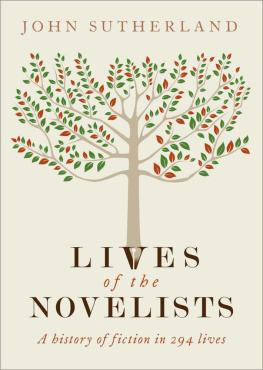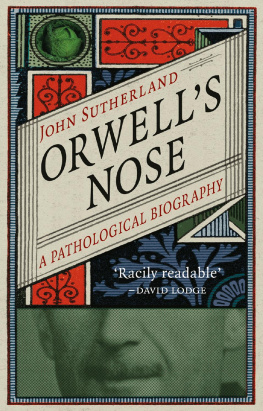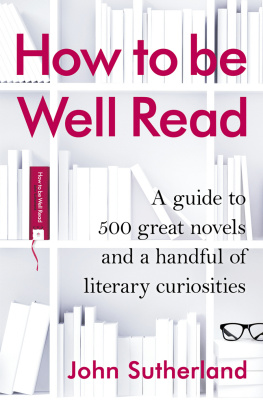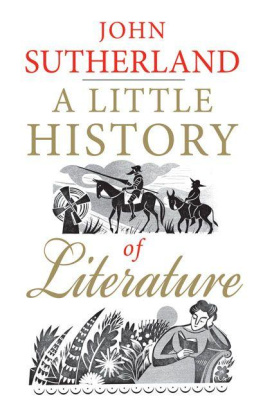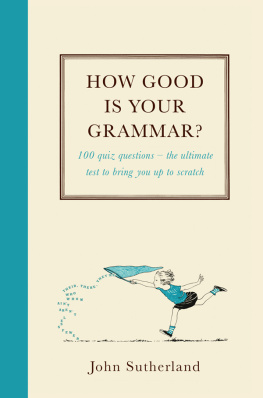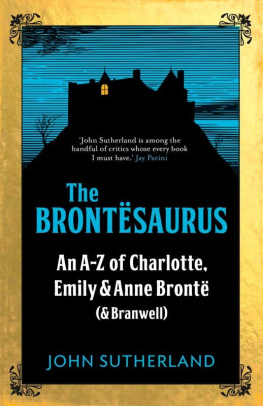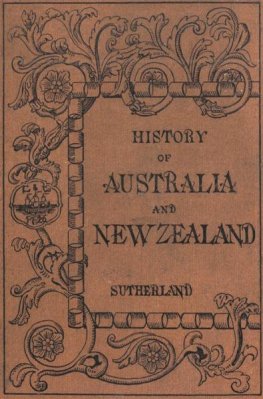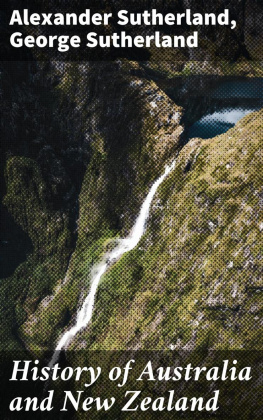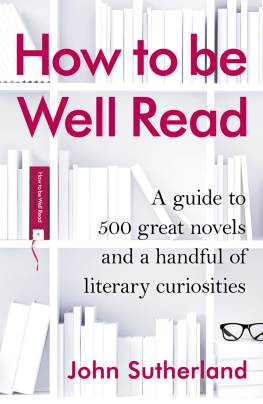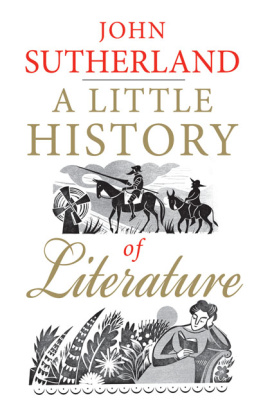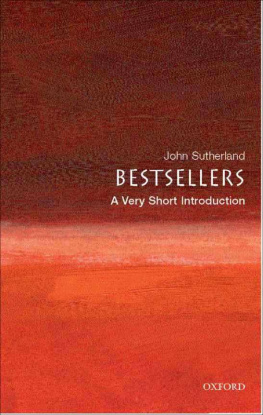The Lives of the Novelists
The Lives
of the Novelists
A History of Fiction in 294 Lives
John Sutherland

First published in Great Britain in 2011 by
PROFILE BOOKS LTD
3A Exmouth House
Pine Street
London EC1R 0JH
www.profilebooks.com
Copyright John Sutherland, 2011
1 3 5 7 9 10 8 6 4 2
Designed by Sue Lamble
Typeset by MacGuru Ltd
Printed and bound in Great Britain by
T J International
The moral right of the author has been asserted.
All rights reserved. Without limiting the rights under copyright reserved above, no part of this publication may be reproduced, stored or introduced into a retrieval system, or transmitted, in any form or by any means (electronic, mechanical, photocopying, recording or otherwise), without the prior written permission of both the copyright owner and the publisher of this book.
A CIP catalogue record for this book is available from the British Library.
ISBN 978 1 84668 157 8
eISBN 978 1 84765 343 7
Contents
The Seventeenth Century
The Eighteenth Century
The Nineteenth Century
The Twentieth Century
Theres a huge popular appetite for secrets. As for the biographical explanation generally it makes matters worse by adding components that arent there and would make no aesthetic difference if they were.
Nathan Zuckerman, Exit Ghost , Philip Roth
The personality of a writer does become important after we have read his book and begin to study it.
E. M. Forster, Anonymity: An Inquiry
A shilling life will give you all the facts.
W. H. Auden (who instructed his friends to burn all his letters, after his death)
My sole wish is to frustrate as utterly as possible the postmortem exploiter.
Henry James (before touching the light to a bonfire of his personal papers)
Authors are just fictional people about whom we have a few biographical elements, never enough to make them truly real people.
Jacques Bonnet
It does not follow that because a particular work of art succeeds in charming us, its creator also deserves our admiration.
Plutarch (in his Life of Pericles ), translated by Peter Jones
Preface
A history of fiction in 294 lives
Once upon a time it would have been possible to write a comprehensive Lives of the Novelists around the time, I would hazard, that Walter Scott wrote his Lives of the Novelists . The 1825 field that Scott surveyed was more or less coverable by a single reader poring diligently over the greats, skimming the less than great, and sniffing at the waste-of-time majority before tossing it aside. In our time, an army of Scotts would be defeated by the two million or so eligible works in the vaults of the Scottish National Library, successor to the Advocates Library which served Sir Walters needs.
All modern histories of the novel are wormholes through the cheese (the novelist William Gibsons neat analogy). The story of fiction that follows is almost as idiosyncratic as the subject itself, it being in the nature of worms to burrow less directly than crows fly both, like literary critics, are scavengers. What Ive written has been sustained by the belief that literary life and work are inseparable and mutually illuminating. This is not, as the epigraphs in the prelims suggest, a thesis universally accepted by the novelists themselves, but do worms care what the cheese thinks?
The reader may be shocked by encounters with a number of writers not normally granted entry to the sacred grove. I confess that I do value a range of fiction that literary history has often, in my view, wrongly undervalued. And the writers who have produced it often have the more interesting lives. By the same token, some names including some great names are missing from this book. I offer two excuses: first, quarts and pint pots; and second, isnt this book big enough? A single book and one persons reading career (however obsessive) cannot contain or cover this richest of literary fields. What I have aimed to achieve in breadth will, I hope, to some extent make up for these absences. All the novels varied genres are displayed in what follows, including (though the main focus is on adult literature) one or two writers best known for their books for children whom I could not bring myself to exclude.
It will be easy to see why most of those writers who did get in got in. What they have in common is that they are all novelists who have meant something to me, or who have come my way over a long reading career and stayed with me, for whatever reason.
John Sutherland
London, August 2011
Acknowledgements
I would like to thank John Davey, Jane Robertson, Peter Carson and Penny Daniel for their support, encouragement, assistance and (all too often) correction. The mistakes which remain are, alas, all mine.
Abbreviations
The following abbreviations will be found appended to the entries:
ANB The American National Biography
Biog a biography which is a useful starting point
DCB Dictionary of Canadian Biography
FN the authors full name(s)
MRT Must Read Text
ODNB The Oxford Dictionary of National Biography
The cited biographies and must-reads are my own wholly personal choices. Where biographical sources are not specifically cited they are taken from the biography which is appended at the end of the entry.
1. John Bunyan 16281688
I have used Similitudes.
John Bunyan was born in Bedford in 1628, in the lowest stratum of that middle England town. His father was an illiterate brazier and tinker, a wandering tradesman. Bunyan later allegorised lifes wanderings into a pilgrimage, heavy pack on back.
Largely self-educated, Bunyan had steeped himself in the English gospels. The most familiar portrait shows him with one book under his arm the Geneva Bible. This is the volume which, at the outset of his Progress , Christian claps to his bosom, fingers in his ears, as he runs away from his amazed wife and family, shouting Life, life, eternal life (and to hell with child support). It struck even Mark Twains Huck Finn as odd. He recalls (among the little he has read) a book about a man that left his family, it didnt say why. I read considerable in it now and then. The statements was interesting, but tough.
Like others of his station in life, the pulpit was Bunyans university and preachers his teachers. Religion, in Bunyans view of life, was battle; and the pilgrims staff was a weapon with which to crack heretical skulls:
No Lion can him fright, Hell with a Giant fight, But he will have a right To be a Pilgrim.
The other cheek was never turned.
He was a Christian soldier, forever marching as to war literally. Before the age of sixteen John Bunyan enlisted in Cromwells Roundhead parliamentary army. He recalls that service and the epic victories over the long-haired foe and not least his sinful self in the spiritual journal, Grace Abounding . There he chronicles his heroic struggle with such vices as bell-ringing (and worse) and his life-and-soul discovery that he was, after all, one of the elect. Election was confirmed when a comrade took his place on guard duty only to be shot into the head with a musket bullet. Could a sign be clearer?
He married around 1650 and had four children by this first marriage. His wifes names are unknown but it is deduced she strengthened his religious sense of mission. She died in 1658 and he remarried the following year. From 1655 he addressed congregations as a militant Baptist preacher. He despised Quakers almost as much as Royalists. The schisms of this period defy description: they would have split the atom, if it had been theology. In 1660, with the return of the new King Charles (one of the elite, not the elect) from France and the downfall of the Commonweal, Bunyan was imprisoned for obstinately preaching without a licence and devilishly and fiendishly not attending lawful church service.
Next page
